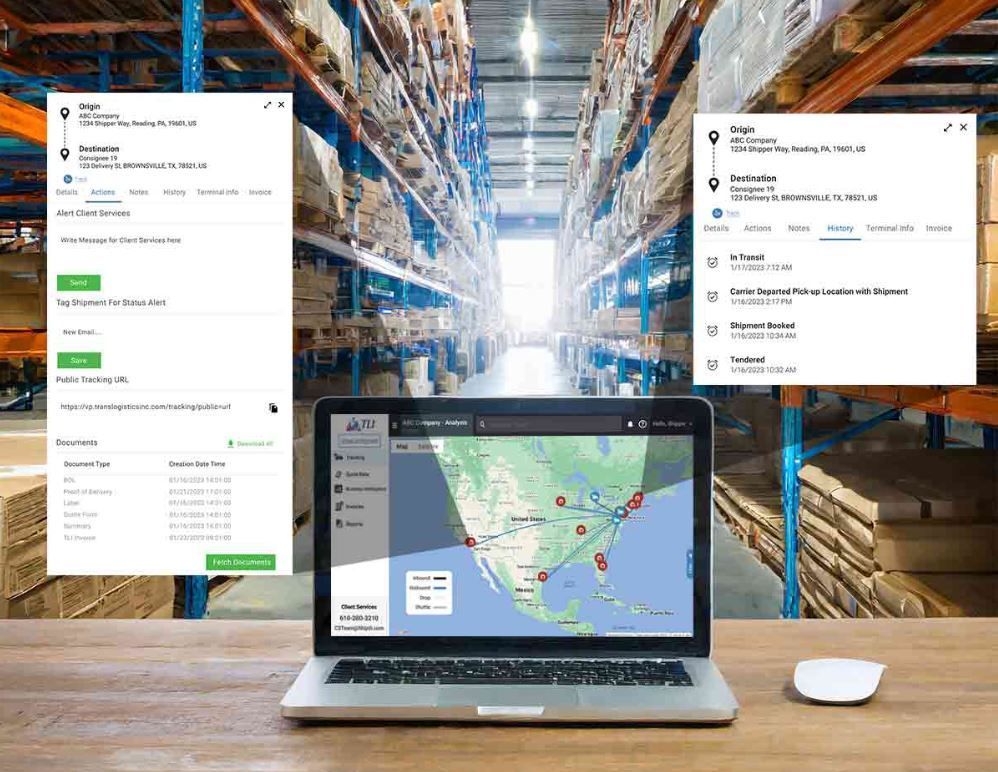5 Strategies for Shippers to Optimize Shipping Efficiency
Freight Shipping Efficiency
Whether you're managing a small business or overseeing operations for a large corporation, optimizing your freight shipping processes is essential for maintaining competitiveness, reducing costs, and meeting customer demands.
In this two-part blog series, we'll delve into five key strategies that shippers can implement to enhance their freight shipping efficiency. From leveraging technology to fostering collaboration with freight brokers, these strategies are designed to streamline operations and drive tangible results.

What are the benefits of improving shipping efficiency?
Efficiency isn't just about saving time and money—it's about maximizing resources, minimizing waste, and ultimately, delivering value to your customers. In today's fast-paced business environment, where every minute counts and customer expectations are higher than ever, inefficient shipping practices can lead to delays, disruptions, and dissatisfied customers.
By optimizing freight shipping efficiency, shippers benefit in several ways:
- Cost Savings: Efficient shipping practices help minimize transportation costs, including fuel expenses, carrier fees, and overheads associated with unnecessary delays or inefficiencies.
- Improved Customer Satisfaction: Timely and reliable deliveries are crucial for meeting customer expectations and maintaining loyalty. Efficient shipping processes ensure that shipments arrive on schedule, enhancing the overall customer experience.
- Competitive Advantage: Businesses that can deliver products quickly, reliably, and cost-effectively gain a competitive edge. By optimizing shipping efficiency, shippers can differentiate themselves and attract more customers.
- Sustainability: Streamlining shipping processes not only reduces costs but also minimizes environmental impact by reducing carbon emissions and energy consumption associated with transportation.

How do freight brokers enhance shipping efficiency?
While shippers play a vital role in managing their shipping operations, partnering with a reputable freight broker can further enhance efficiency and effectiveness. Freight brokers act as intermediaries between shippers and carriers, leveraging their industry expertise, network connections, and negotiating skills to optimize shipping processes and ensure smooth operations.
Access alternative equipment types:
Freight brokers maintain extensive networks of carriers, including trucking companies, railroads, air freight providers, and ocean carriers. This broad network enables brokers to quickly identify the most suitable carrier mode of transportation for each shipment based on factors such as route, cargo type, and delivery timeline. By tapping into this diverse pool of carriers, shippers can access competitive rates and reliable transportation options, enhancing overall efficiency. Perhaps as a shipper you primarily only use LTL carrier networks, and van FTL shipments. Well perhaps you have new machinery coming in and need a flatbed, a freight broker like TLI can easily offer access to modes and equipment types that while rare, are important loads that need to be handled well.
Negotiate competitive rates:
One of the primary advantages of partnering with freight brokers is their ability to negotiate favorable rates on behalf of shippers. Brokers leverage their industry expertise, market research insights, and negotiating skills to secure cost-effective transportation solutions, helping shippers reduce their shipping costs and improve their bottom line. Whether it's securing volume discounts, optimizing freight consolidation, or negotiating favorable contract terms, brokers play a crucial role in driving cost savings and enhancing efficiency.
Shipping documentation compliance:
Shipping involves a myriad of paperwork, documentation, and regulatory requirements, ranging from bills of lading to customs declarations. Freight brokers help streamline these administrative tasks by managing documentation, ensuring compliance with regulatory standards, and coordinating with relevant authorities. By outsourcing these responsibilities to experienced shipping brokers, shippers can save time, minimize errors, and ensure smooth customs clearance, thereby improving overall shipping efficiency.
Tracking and issue resolution support:
Real-time visibility and tracking capabilities are essential for efficient freight management. Freight brokers leverage advanced technology platforms and tracking systems to provide shippers with real-time visibility into their shipments' status, location, and estimated delivery times. This transparency allows shippers to proactively monitor their shipments, identify potential issues or delays, and make informed decisions to mitigate risks and optimize delivery schedules. When routing thousands of shipments, damages occur along with lost freight, and this is where a freight brokerage can offer a great deal of support by mitigating the
damaged freight claim or disputing a
carrier freight bill that arrived incorrect.
Strategy for Enhancing Shipping Efficiency
Embrace TMS Technology Solutions
Shippers can leverage advanced transportation management systems (TMS), route optimization software, and real-time tracking solutions to enhance visibility, automate tendering processes, and identify optimization opportunities. By embracing technology, shippers can streamline operations, reduce manual errors, and gain insights to make informed decisions.
Foster Strategic Partnerships
Collaboration is key to success in the logistics industry. Shippers can foster strategic partnerships with carriers, suppliers, and freight brokers to streamline operations, share resources, and leverage expertise. By building strong relationships based on trust, transparency, and mutual benefit, shippers can access additional capacity, negotiate favorable rates, and overcome challenges more effectively. Strategic partnerships enable shippers to adapt to changing market conditions, optimize resource allocation, and achieve long-term success.
Continuously Monitor and Improve Performance
Continuous improvement is essential for maintaining competitiveness and driving sustainable growth. Shippers should regularly monitor key performance indicators (KPIs), analyze freight data, and identify areas for optimization. By leveraging analytics tools and performance metrics, shippers can pinpoint inefficiencies, implement corrective actions, and continuously refine their shipping processes. Continuous improvement fosters a culture of innovation, adaptability, and excellence, enabling shippers to stay ahead of the curve and deliver superior value to customers.
Optimizing Freight Shipping: TWO ADVANCED TECHNIQUES

Shipment Data and Mode Optimization Software
Shippers can extract valuable insights from the wealth of shipment data provided by third-party logistics (3PL) freight brokers to drive informed decision-making and optimize their transportation strategies. By collaborating with a trusted 3PL partner like Translogistics, shippers gain access to sophisticated mode optimization software that analyzes shipment data to identify opportunities for consolidation and mode optimization.
Translogistics' mode optimization software employs advanced algorithms to analyze historical shipment data, identify patterns, and predict future shipping needs. By leveraging this freight optimization technology, shippers can explore raw materials and inbound freight to identify opportunities for consolidation and optimization. For example, shipments with similar destinations or delivery timelines can be combined into larger, more cost-effective loads, reducing transportation costs and improving overall efficiency.
Furthermore, Translogistics' mode optimization software takes into account various factors such as transit times, carrier preferences, and service levels to recommend the most efficient transportation modes for each shipment. Whether it's truckload (TL), less-than-truckload (LTL), rail, or intermodal, the software optimizes mode selection to minimize costs and maximize efficiency.

Launching a Carrier Request for Proposal (RFP)
Another advanced technique for shippers looking to optimize their freight shipping efficiency is to leverage Translogistics' expertise in carrier procurement. Rather than navigating the complex process of carrier selection and negotiation independently, shippers can entrust Translogistics to launch a carrier RFP on their behalf, tailored to their unique shipping profile and requirements.
Translogistics' team of procurement experts utilizes a data-driven approach to identify and evaluate potential carriers based on factors such as service capabilities, geographic coverage, equipment availability, and pricing. By leveraging Translogistics' extensive network of carrier partners and industry relationships, shippers can access competitive rates and secure reliable transportation options that align with their specific needs.
Furthermore, Translogistics' carrier RFP process is customized to each shipper's unique requirements, ensuring that the selected carriers meet their performance expectations and service level agreements. From conducting comprehensive carrier evaluations to negotiating favorable contract terms, Translogistics handles every aspect of the procurement process, allowing shippers to focus on their core business activities. By outsourcing carrier procurement to Translogistics, shippers can streamline their operations, reduce administrative burdens, and achieve greater efficiency in their freight shipping processes.
In conclusion, advanced techniques such as harnessing shipment data and mode optimization software, and leveraging Translogistics' expertise in carrier procurement, offer shippers powerful tools to optimize their freight shipping efficiency. By embracing these innovative strategies and partnering with trusted industry leaders like Translogistics, shippers can unlock new opportunities for cost savings, performance improvement, and competitive advantage in today's dynamic logistics landscape.
TLI Insights
Get the latest logistics insights and tips from TLI's award-winning team. Stay ahead in transportation planning.
Questions? Email us at marketing@shiptli.com




